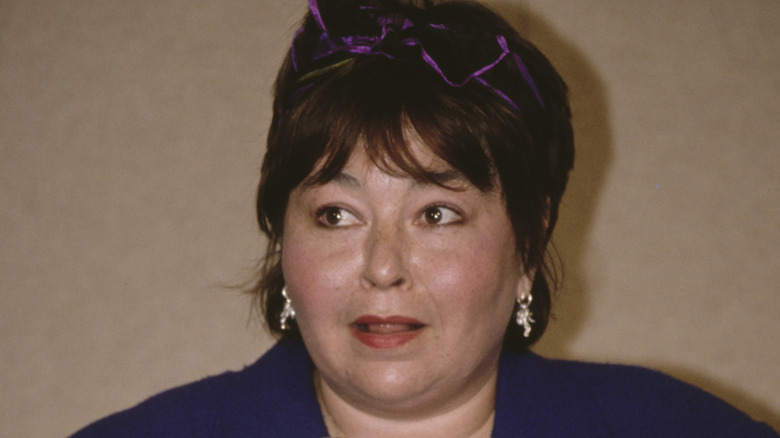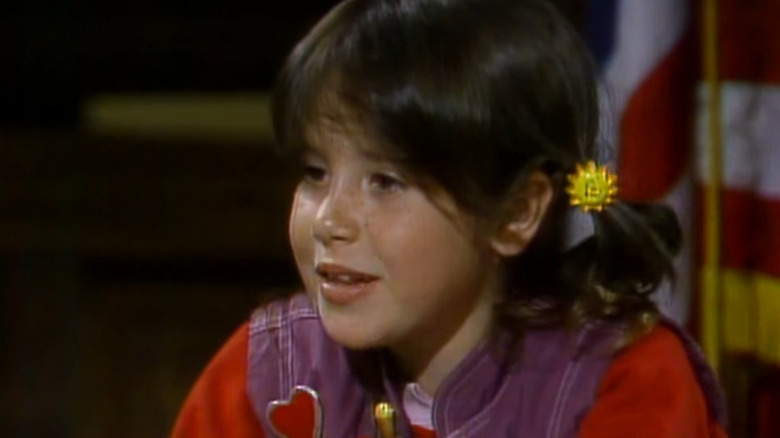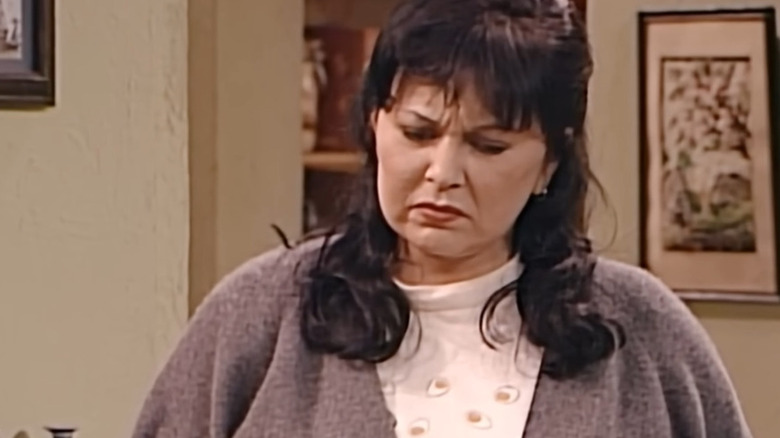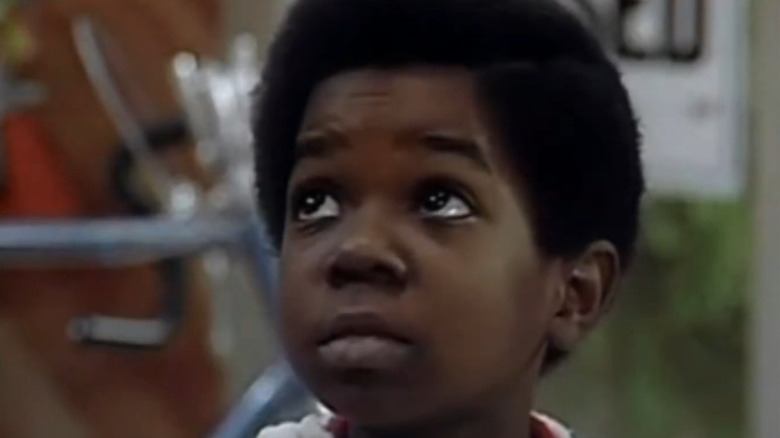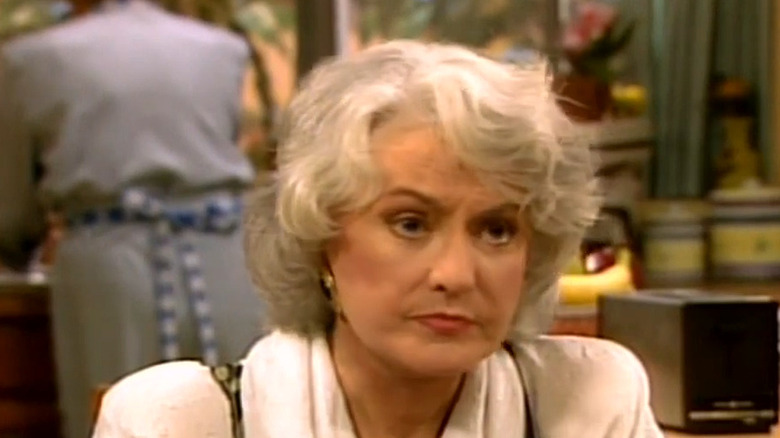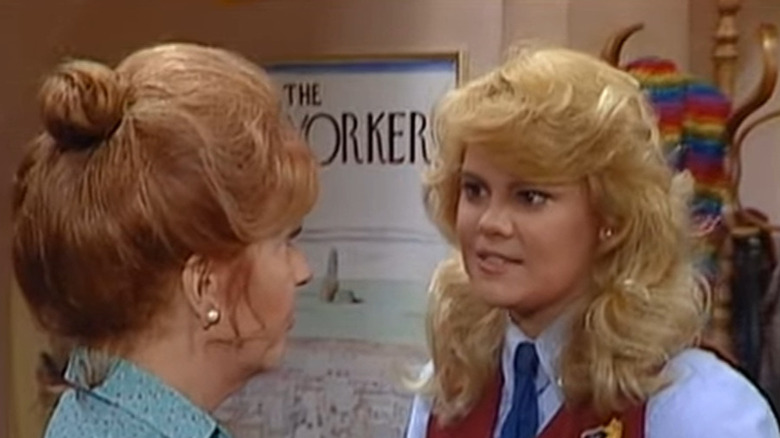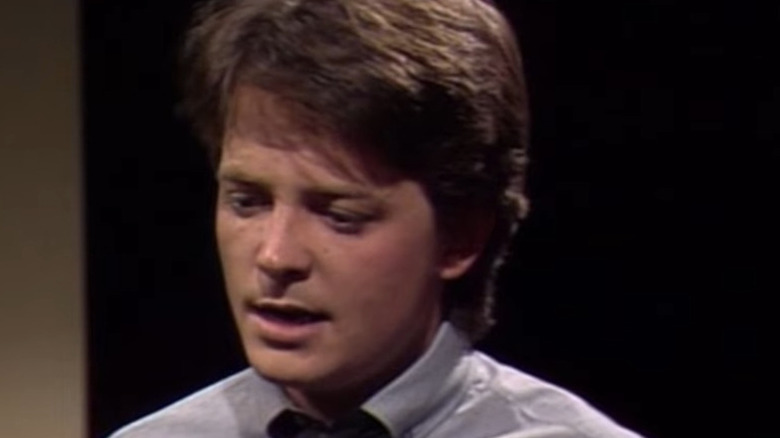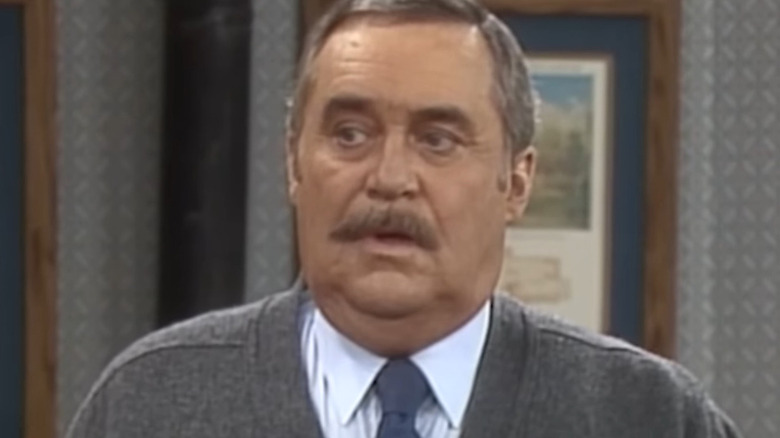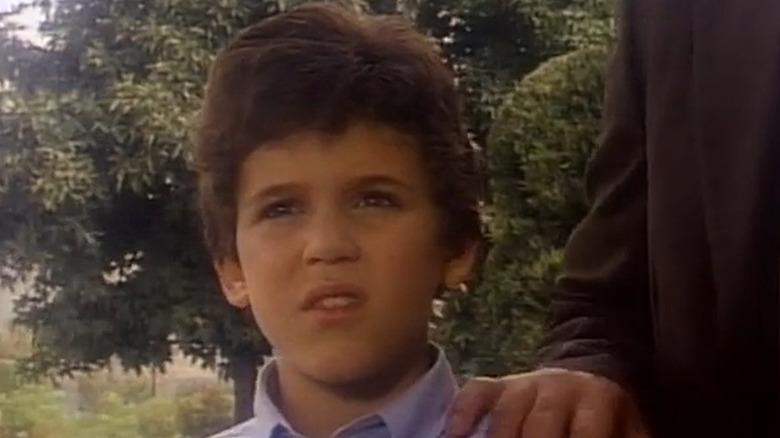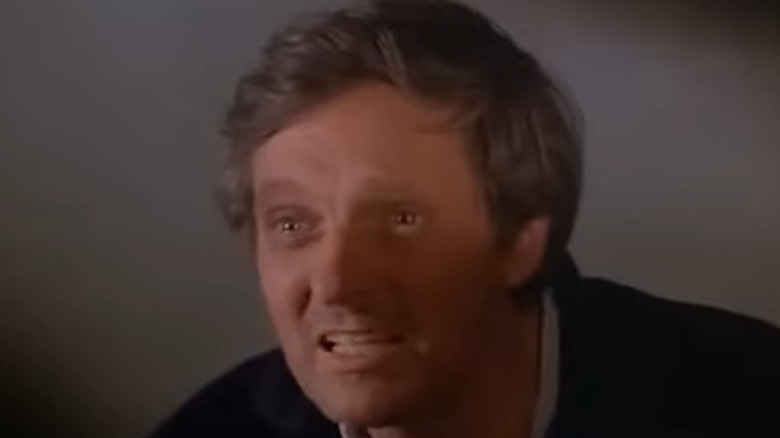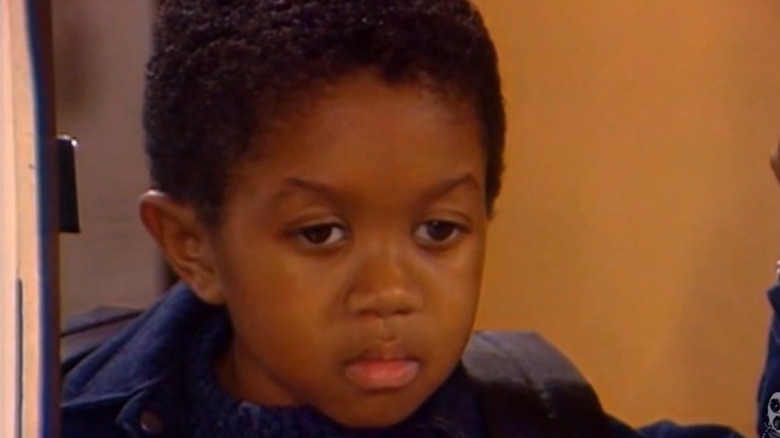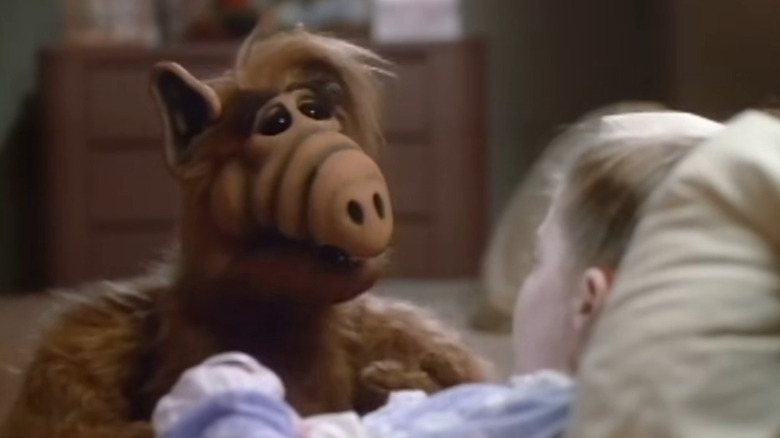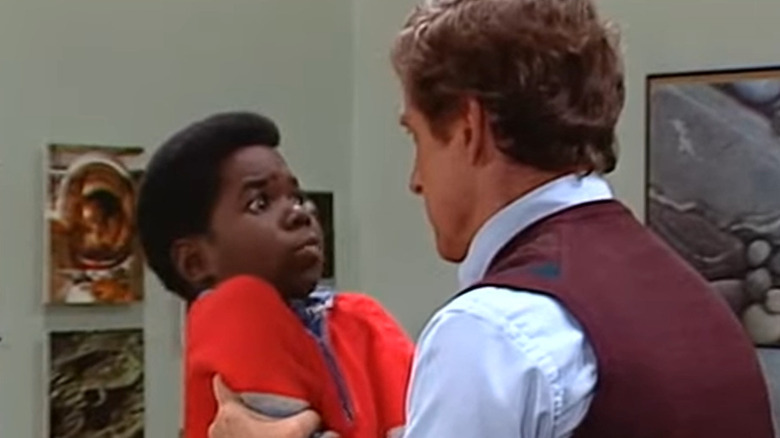The Darkest Sitcom Moments Of The '80s
This article contains references to substance abuse, sexual assault, and suicide.
The 1980s were a wild time in pop culture — and life in general — on just about every front. A former Hollywood actor was the president of the United States, shoulder pads and neon colors were all the rage, smoking was the norm pretty much everywhere, parents were terrified of kidnappers but still let their kids roam free, and some animated children's programming existed solely to mass market toy lines. Sticking with the television realm, it was also the era in which "very special episodes" — a phrase coined to describe episodes that broke from a series' usual format to explore more serious and even uncomfortable topics — rose to prominence. These episodes tackled everything from violence, sex, teen pregnancy, and abortion to drug and alcohol abuse, HIV/AIDS, and even death.
Between the sensitive material covered in those episodes and the very different cultural sensibilities that existed back then in terms of what was considered appropriate television viewing, the '80s provided fertile ground for some of the more haunting TV moments of all time, particularly in sitcoms. While the comedy in those shows was typically fairly on the nose and inoffensive, there were times when it took a backseat to unusually dark themes and narratives. With that in mind, here are some of the darkest sitcom moments of the '80s.
Cherie nearly suffocated to death in an episode of Punky Brewster
Running for four seasons on NBC and in syndication from 1984 to 1988, "Punky Brewster" told the story of the titular spunky (Punky?) orphaned girl who is taken in by a widowed building manager in Chicago, as well as her friends in the building. The show made star Soleil Moon Frye one of the most memorable child stars of the 1980s. However, in the second season episode "Cherie Lifesaver," it scared parents and children around the nation when Punky's friend Cherie (Cherie Johnson, who went on to do a lot after the show) gets trapped in a refrigerator and nearly suffocates during a game of hide and seek. Luckily, the gang had learned CPR and were able to save her life.
"It traumatized so many," Frye told Today in 2021. "But it was so incredible. The episode, I believe, was written in by a kid who, like, they had kids send in ideas. And it was so incredible. Because so many people would come up to us afterwards that had actually used the CPR they had learned through Punky and through Cherie, and then actually really applied it in real life ... And I think Cherie, to be honest, still has a fear of refrigerators."
A door-to-door salesman died in the Conners' kitchen on Roseanne
"Roseanne" and all its untold truths ran on ABC for 10 seasons beginning in 1988 (later birthing a revival series and "The Conners"), was never afraid to get messy or veer into dark territory, in keeping with Roseanne Barr and her irreverent brand of comedy. That includes turning an everyday situation like a traveling salesman appearing at the door into tragedy, which is exactly what happened during the 1989 episode "Death and Stuff."
In the episode, Roseanne is summoned to the door by an elderly man who's selling cleaning supplies. And while Roseanne doesn't buy anything, she lets the man into her house for a drink of water, only to discover later that he has passed away in the kitchen. Of course, humor ensues as the Conner family — including Roseanne's husband, Dan (John Goodman), and their three children — has to go about their daily business with a corpse at their dinner table while anxiously awaiting the arrival of the coroner. The episode has been listed among the best in the series' long-running history.
The two-part episode where Arnold and Dudley encounter a child predator on Diff'Rent Strokes
Starring child stars Gary Coleman and Todd Bridges, "Diff'rent Strokes," which ran for seven seasons on NBC from 1978 to 1985 before wrapping up with an eighth season on ABC in 1986, chronicled the lives of two brothers from Harlem who are taken in by a rich widower when their mother dies. And as with most sitcoms of the era, it had its share of "very special episodes." However, the 1983 two-part episode "The Bicycle Man" may have been the first of its kind, and it was particularly unsettling due to its depiction of the potential exploitation of children.
In the episode(s), a bicycle shop owner sells Arnold (Coleman) a birthday bike at a reduced price, then later offers him a deal for a free handlebar radio if he passes flyers out to other kids at his school. Arnold's friend, Dudley (Shavar Ross), also gets in on the deal in hopes of getting a free radio of his own. The two get more than they bargained for, though, as the bicycle man attempts to lure the boys with gifts, including wine and pornographic magazines, and asks them to keep their meetings secret. He later shows them naked pictures of himself with other children and attempts to drug and touch Dudley. In the end, the kids were saved, the bicycle man was discovered and arrested, and viewers everywhere were horrified.
Dorothy was laugh-tracked on The Golden Girls while recounting a story of being date-raped
While the majority of sitcoms focus on the comings and goings of much younger individuals, "The Golden Girls," which aired on NBC from 1985 to 1992 and has a stunning connection to the current hit, "And Just Like That," showed that older women can get up to seriously entertaining hijinks, too. That said, the series featured a veritable bonanza of tense, serious, and even dark moments. For every "very special episode," though, there was also a dark moment on the show that was completely unintentional or only became dark when reassessed years later through a modern lens.
Perhaps the best (or worst) example of this was during the Season 5 episode "The Accurate Conception," in which the girls shared the stories behind their children's conception. For her part, Dorothy (Bea Arthur) describes something that reads as nonconsensual today, recounting that she did not consent when her former husband impregnated her. "I was totally unconscious," she recalled while a laugh track played in the background. "When I came to, there was Stan — carving a notch on his dashboard." The laughter then became uproarious when she and her mother, Sophia (Estelle Getty), bantered about the fact that Stan must have slipped her something. Clearly, they don't make them like they used to — and, in some cases, that's probably a good thing.
The Facts of Life tackled teen suicide
A spin-off of "Diff'rent Strokes," "The Facts of Life" was a staple of NBC's programming slate for nine seasons, from 1979 to 1988. An all-girls boarding school in New York provided the backdrop for stories involving a group of girls and their house mother during the series' first several seasons. Several "very special episodes" of the series were produced, with topics ranging from human trafficking to teen suicide and drugs. The latter two were addressed in the 1981 episode, "Breaking Point," during which Blair (Lisa Whelchel) squares off with a new student and diplomat's daughter, Cynthia (Denise Halma), for the Student Council presidency.
Cynthia ultimately wins the vote, with Blair finishing as runner-up, and the two are set to become president and vice-president, respectively. However, after being overcome by the pressure and emotions surrounding her parents' impending divorce, her election loss, and her inability to please her father, Cynthia overdosed on pills. She's later found by two of the other girls — Tootie (Kim Fields) and Natalie (Mindy Cohn) — and an ambulance is called, but Cynthia ultimately dies at the hospital.
A friend's death forces Alex to face his mortality on a two-part episode of Family Ties
The series that made Michael J. Fox a star — and helped him land his "Back to the Future" role — "Family Ties" told the story of the Keaton family and its dynamic of a liberal, ex-hippie couple raising an ultra-conservative/yuppie teenage son, two daughters, and, later, a second son, across seven seasons (from 1982 to 1989) on NBC. And the push-and-pull between Alex (Fox) and his parents and siblings made for some hilarious situations. At times, though, hard lessons had to be learned in the Keaton household.
Such was the case in the 1987 two-part episode "A, My Name Is Alex," when the Keatons' son is forced to face his own mortality following the death of a friend. In the episode(s), Alex's longtime friend Greg (Brian McNamara) dies in a car accident while running an errand that Alex was asked to accompany him on (he declined essentially out of laziness). As a result, the boy deals with intense survivor's guilt, ends up in therapy, and must reconcile his thoughts on life, death, the existence of God, and more. "I was supposed to be in that car with him," Alex tells his sister, Mallory (Justine Bateman), during the episode. "My life was saved out of smallness, out of lack of generosity to a friend."
A camp counselor crossed a line in an episode of Mr. Belvedere
Starring retired baseball star and longtime Milwaukee Brewers announcer Bob Uecker and English actor Christopher Hewett, "Mr. Belvedere" aired for six seasons on ABC from 1985 to 1990 and chronicled the exploits of a British butler working for the Owens clan, an upper-middle-class family in suburban Pittsburgh. In the 1988 episode, "The Counselor," the Owens' youngest son, Wesley (Brice Beckham), is attending day camp under duress when he feigns a stomach illness in order to get out of participating in a nature hike. As a result, he's left alone with an assistant counselor named Perry, who decides to take him snorkeling. After the swim, Perry touches Wesley inappropriately after volunteering to dry him off.
For the remainder of his stay at the camp, Wesley avoids Perry and grapples with whether to tell anybody about what happened to him. In the end, he decides to come clean when a fellow camper is about to go off alone with Perry, and it's implied that his family informed the police. As if it were included to take the edge off the heavier moments, the episode also featured a bizarre subplot where George Owens avoids golfing with Mr. Belvedere (Hewett) after an ill-fated round on the links.
Winnie Cooper's brother was killed in Vietnam in the pilot episode of The Wonder Years
While "The Wonder Years" definitely had its laugh-out-loud moments, the ABC coming-of-age series may be best described as a dramedy given the subject matter of some episodes. Running for six seasons from 1988 to 1993, the series followed the story of the Arnolds, a middle-class family living their lives amid the turbulence of the late 1960s and early '70s. It didn't take long for the show to delve into some of the darker themes of the era, namely the incredible cost of war (in this case, the war in Vietnam). During the "The Wonder Years" pilot episode, it's revealed that young Kevin Arnold's (Fred Savage) friend, Winnie Cooper (Danica McKellar), has a brother fighting overseas. As the episode nears its conclusion, it's revealed that Winnie's brother was killed in action.
McKellar later described the death of her character's brother, which hung over the series for years afterward, as universally relatable. "Winnie Cooper's brother died in Vietnam, in the beginning of the show, but he could have died from anything. It was just about the loss," McKellar said during a retrospective cast interview (via Collider). "There are very universal things that happen in any time period, which is why I think people can relate to the show, even if they didn't experience the '60s."
The heartbreaking M*A*S*H finale deals with the toll of war, PTSD, death (including that of an infant), and more
War's incredible toll was explored with more depth in the series finale of "M*A*S*H," which capped off an 11-season run that began all the way back in 1972. The 1983 episode, which was viewed by a whopping 125 million people, followed the waning days of the Korean War at the 4077th MASH (Mobile Army Surgical Hospital) unit, and they are heartbreakingly eventful. Among the tear-filled goodbyes, the deaths of friends, and other happenings, a story recounted by Hawkeye Pierce (Alan Alda) following an operating room breakdown caused by PTSD stands apart.
In the story, Pierce recalls telling a refugee to keep a chicken she's holding quiet during a bus ride, and the woman ends up smothering the chicken to death while attempting to comply with his request. However, as he recalls the incident, Hawkeye realizes that the refugee actually suffocated her own infant child. "We were lucky to be able to present human stories, in spite of the fact that it was a comedy, to let in the tragedy and horror of war," Alda told Vanity Fair of the show in 2019. "The audience responded to what we did, because while we had wonderful writers and actors, we were all serving something human — not just the commercial end of getting people to watch."
Webster overhears a friend being touched inappropriately by a substitute teacher
Starring Emmanuel Lewis, "Webster" was a sitcom that ran for six seasons on ABC and in syndication from 1983 to 1989, chronicling the adventures and misadventures of a little orphan boy who's adopted by his retired-football-star godfather and the man's high-society wife in Chicago. In the Season 2 episode, "The Uh-Oh Feeling," Webster's friend Beth (Alison Sweeney) is asked to stay after class by a substitute teacher named Mr. Toddson. Upon realizing he has his friend's books, Webster returns to the classroom to return them to her, only to witness the substitute touching his friend. The camera remains on Webster's concerned face as she asks the teacher to "stop tickling me there." Webster calls out to her, after which the teacher stops and makes her promise not to tell anyone, lest she get in trouble.
For the remainder of the episode, Webster is consternated about having to meet with Mr. Toddson himself and even pretends to be sick so he doesn't have to go to school. Eventually, Webster decides to tell his parents, who then tell the girl's mother, but she refuses to believe the story, at least initially. In the end, though, they inform the authorities, and Beth and her mom thank them for their efforts. Collider later ranked it as one of the best "very special episodes" of all time.
ALF's holiday special brought a new meaning to seasonal depression with a dying kid and a Santa who wants to die
Where its premise was concerned, "ALF," which aired on NBC for four seasons from 1986 to 1990, was about as tame as could be for a sitcom of its era. The series followed alien Gordon Shumway, nicknamed ALF for the term "alien life form," as he lived out his days with a middle-class Californian family. However, the show's Season 2 Christmas special went exceedingly hard. During the episode, ALF negotiates with a depressed hospital Santa to prevent him from ending his own life by leaping from a bridge. He also sits with a young girl in the hospital who only has one year left to live due to an illness.
The latter story was apparently based on a real-life exchange between ALF/his puppeteer and voice actor, Paul Fusco, and a terminal patient. "Someone at the local NBC station arranged a kind of video conference setup between her in her hospital bed and ALF," Fusco told Yahoo! in 2017. "He also had the presence of mind to turn on the tape and record it! [Former NBC president] Brandon Tartikoff saw it and thought, 'We should make a Christmas special around this story.'"
Another Diff'rent Strokes episode featured a serial kidnapper
As with most of the series on this list, "Diff'rent Strokes" actually had several episodes that touched upon controversial and even unsettling topics. In the 1984 two-part episode, "The Hitchhikers," Arnold (Gary Coleman) and his adoptive sister Kimberly (Dana Plato, who had a tragic life of her own) decide to hitchhike while out shopping for a birthday gift for their father despite having been warned against it. They're picked up by Bill (Woody Eney), who seems all too happy to give them a ride home. However, he pretends to make a wrong turn and instead brings them to his own house and refuses to let them leave.
Later, he tapes Arnold's limbs and mouth and makes unwelcomed advances toward Kimberly, forcing her to go on a fantasy date with him and growing increasingly angry when she tries to resist. Eventually, Arnold is able to escape and notify the police, who went on to break into Bill's residence to rescue Kimberly, who doesn't want to file charges due to not wanting to see Bill again, despite the revelation that he has preyed upon other girls. Ultimately, Arnold offers to go to the station in her stead.
If you or anyone you know needs help with substance abuse, sexual abuse, or is in a crisis, contact the relevant resources below:
-
The Substance Abuse and Mental Health Services Administration website or contact SAMHSA's National Helpline at 1-800-662-HELP (4357).
-
The Rape, Abuse & Incest National Network website or contact RAINN's National Helpline at 1-800-656-HOPE (4673).
-
Call or text 988 or chat 988lifeline.org.

